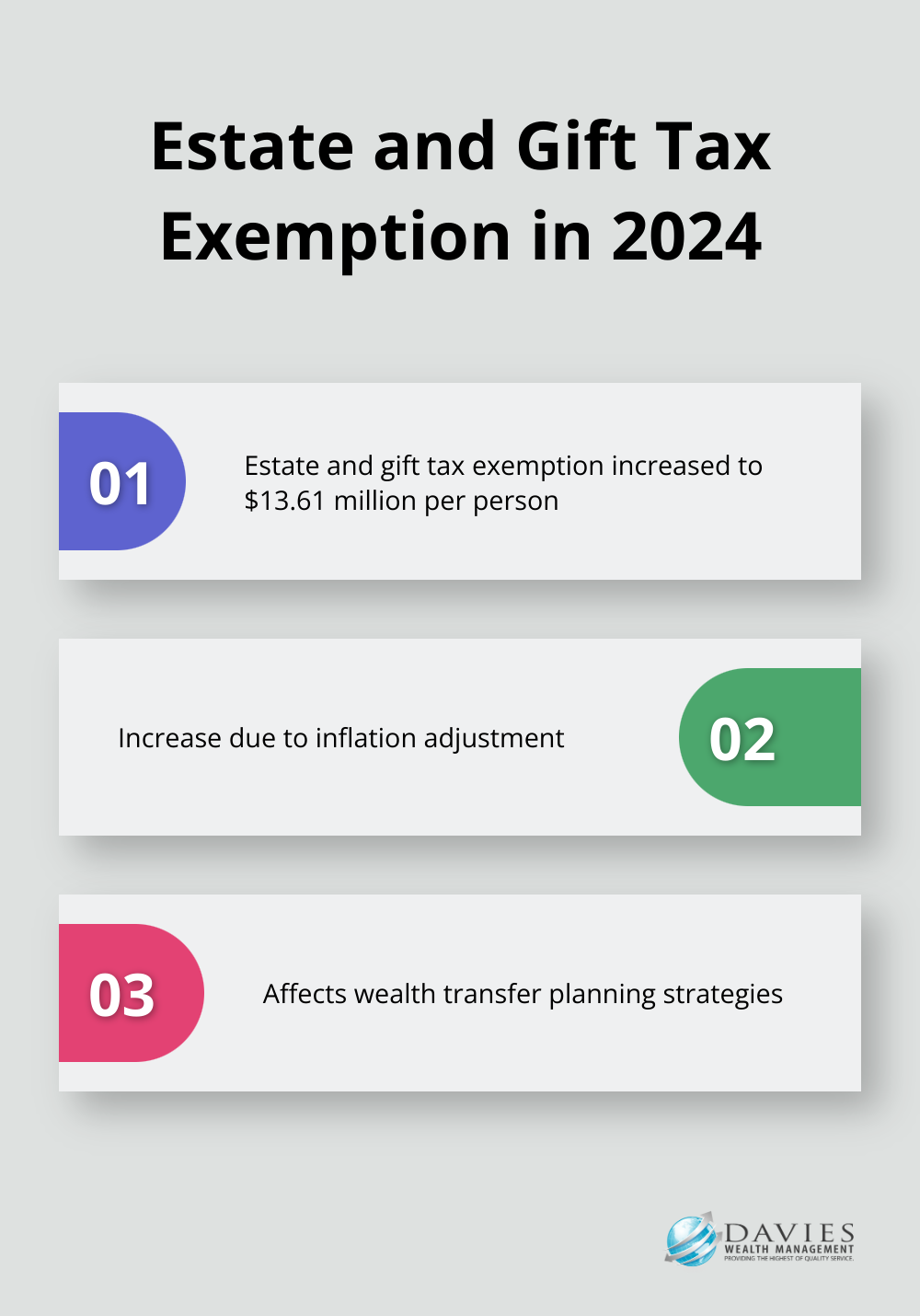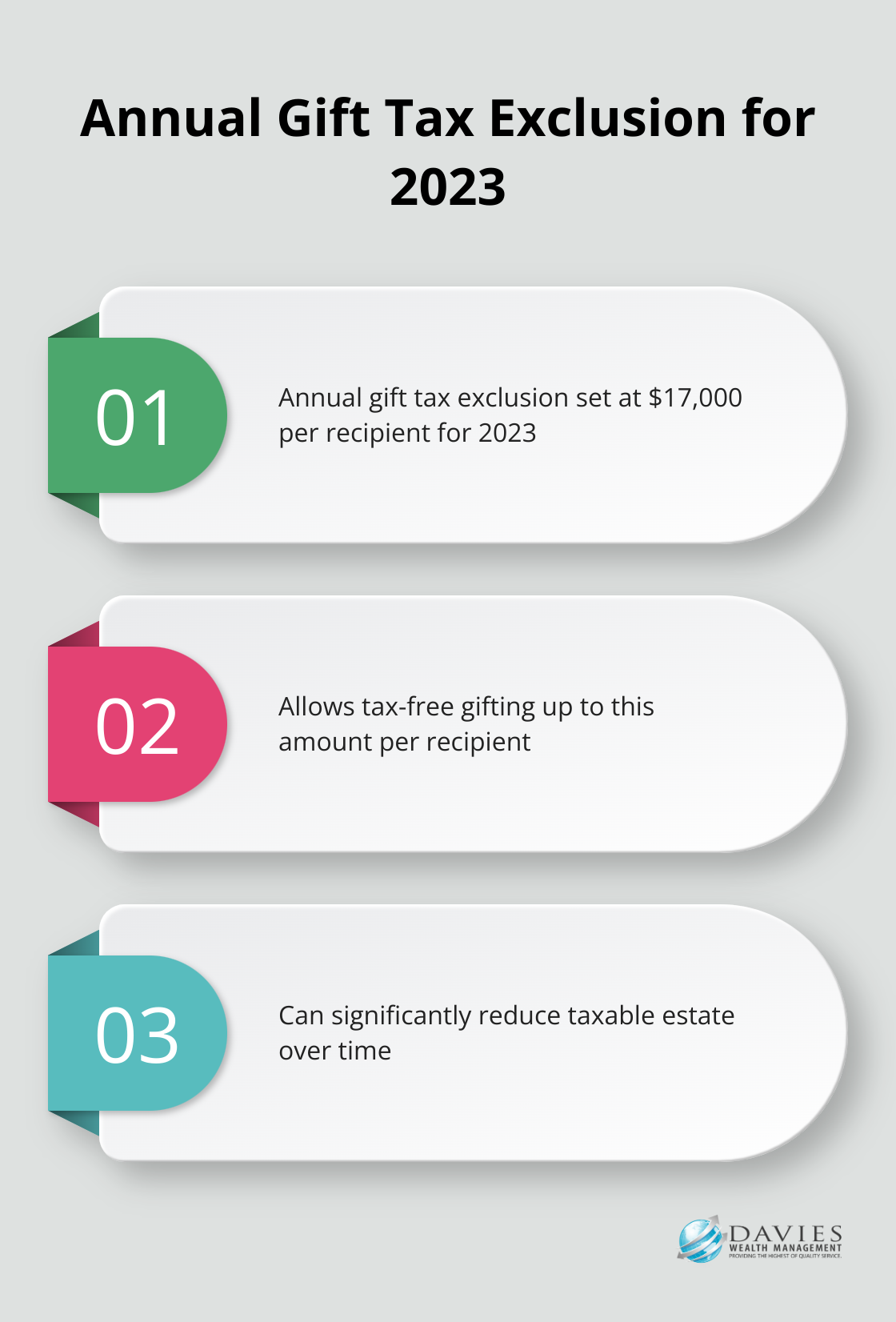Generational wealth transfer is a critical process that can shape a family’s financial future for decades to come. However, without proper planning and execution, this transfer can lead to significant challenges and potential loss of assets.
At Davies Wealth Management, we understand the complexities involved in passing down wealth and the importance of a well-structured approach. This blog post will explore key strategies and professional guidance to help you navigate the wealth transfer process smoothly and effectively.
What Is Generational Wealth Transfer?
Definition and Scope
Generational wealth transfer refers to the passing of assets or businesses from one generation to the next, which safeguards the family’s future wealth. This process encompasses the transfer of cash, real estate, businesses, stocks, bonds, and other valuable assets. The scope of this transfer can significantly impact a family’s financial legacy for generations to come.
The Critical Nature of Proper Planning
Planning for generational wealth transfer extends beyond simple asset division; it focuses on the preservation and growth of family wealth over time. A well-structured strategy can prevent the loss of wealth to taxes, mismanagement, or family disputes. These factors underscore the importance of thoughtful, comprehensive planning.
Common Obstacles in Wealth Transfer
Communication Barriers
Many families find discussions about money matters uncomfortable, which can lead to misunderstandings and conflicts later on. This lack of open communication often results in heirs being unprepared for their future responsibilities.
Financial Literacy Gaps
Another significant challenge is the potential lack of financial knowledge among heirs. Without proper education, younger generations may struggle to manage inherited wealth effectively, potentially leading to poor financial decisions.
Legal and Tax Complexities
The ever-changing landscape of estate tax laws presents a formidable challenge in creating long-term wealth transfer plans. For example, in 2024, the estate and gift tax exemption increased to $13.61 million per person due to inflation.

Effective Strategies for Wealth Transfer
To overcome these challenges, families should prioritize open communication and early education. Regular family meetings to discuss financial matters can help align expectations and values across generations. Involving younger family members in philanthropic decisions can instill a sense of responsibility and financial awareness.
The creation of a comprehensive estate plan stands as a cornerstone of successful wealth transfer. This plan should include not just a will, but also consider tools like trusts, which can provide more control over how and when assets are distributed. A generation-skipping trust, for instance, can help families transfer wealth to grandchildren while potentially reducing estate taxes.
Professional guidance plays a pivotal role in navigating the complexities of generational wealth transfer. Experienced advisors can create tailored plans that address a family’s unique needs and goals, ensuring a smooth and efficient transfer of wealth to future generations. As we move forward, we’ll explore key strategies that can further enhance the success of your wealth transfer plan.
Mastering Wealth Transfer Strategies
Open Communication: The Foundation of Successful Transfers
Transparent financial discussions within families form the bedrock of effective wealth transfer. Regular family meetings should address the overall financial situation, investment strategies, and long-term goals. A UBS study reveals that high-net-worth individuals who discuss their legacy with their children feel more confident about their financial future.
Financial Education: Preparing the Next Generation
Equipping younger family members with financial knowledge is essential. Financial literacy programs and workshops can significantly impact future wealth management. The National Financial Educators Council reports on the importance of financial education in improving financial wellness and literacy.
Comprehensive Estate Planning: A Necessity, Not an Option
A robust estate plan serves as the cornerstone of successful wealth transfer. This plan should encompass a will, power of attorney, and healthcare directives. Surprisingly, a Caring.com survey found that only 33% of Americans have a will or living trust, underscoring the importance of early estate planning.

Advanced Legal Structures: Maximizing Transfer Efficiency
Trusts offer powerful tools for wealth transfer. For instance, a generation-skipping trust can transfer assets to grandchildren while potentially reducing estate taxes. The IRS reported that in 2021, only 1,275 estate tax returns were filed for taxable estates, highlighting how effective planning can minimize tax liabilities.
Adaptability: The Key to Long-Term Success
Your wealth transfer plan should evolve with changing circumstances. Annual reviews (or after significant life events) help ensure your plan remains relevant and effective. A Fidelity study found that failing to update estate plans is a common pitfall in legacy planning.
Professional guidance plays a vital role in navigating these complex strategies. Experienced advisors can create tailored plans addressing a family’s unique needs and goals, ensuring a smooth and efficient transfer of wealth to future generations. The next chapter will explore how professional guidance can further enhance your wealth transfer journey.
Navigating Wealth Transfer with Expert Guidance
The Power of Financial Advisors
Financial advisors form the cornerstone of effective wealth transfer planning. They provide a comprehensive view of your financial landscape, aligning your wealth transfer objectives with your overall financial strategy. Financial advisors who are well-versed in the necessary terminology and comfortable connecting with high-net-worth clients are particularly valuable in this process.
Financial advisors specialize in creating detailed wealth transfer plans. They begin by understanding your family dynamics, financial goals, and values. This approach allows them to develop strategies that mitigate risk, diversify portfolios, and achieve a balance between risk and return.
Harnessing Legal Expertise
Estate planning attorneys prove indispensable in the wealth transfer process. They ensure your wishes remain legally binding and that your estate plan complies with current laws. According to the American Bar Association, attorneys serving as fiduciaries may receive only one fee, which can help control costs in the estate planning process.
These legal professionals help you navigate complex structures like trusts, which offer greater control over asset distribution. For example, a qualified personal residence trust (QPRT) allows you to transfer your home to your heirs while minimizing gift and estate taxes.
Optimizing Tax Strategies
Tax professionals play a vital role in developing strategies to minimize the tax burden on your wealth transfer. Recent research shows that some of the nation’s wealthiest individuals pay little or no income tax each year, highlighting the importance of effective tax planning.
These experts help you leverage tax-efficient transfer methods. They might suggest using the annual gift tax exclusion, which allows you to give up to $17,000 per recipient in 2023 without incurring gift tax. This strategy can significantly reduce your taxable estate over time.

Choosing the Right Advisors
The selection of advisors who understand your unique situation proves paramount. For instance, professional athletes require specialized expertise in managing high, fluctuating incomes and short career spans.
Davies Wealth Management offers this specialized knowledge for professional athletes. Our team provides personalized financial planning strategies that address these complexities, helping athletes manage their current wealth and secure their long-term financial future beyond their playing years.
Collaborative Approach to Wealth Transfer
A collaborative approach among financial advisors, estate planning attorneys, and tax professionals ensures all aspects of your financial plan work in harmony to achieve your goals. This synergy creates a robust wealth transfer plan that secures your family’s financial future for generations to come.
Final Thoughts
Generational wealth transfer requires careful planning and expert guidance. Early action allows for thorough consideration of all aspects, from financial education for heirs to the creation of comprehensive estate plans. Professional advisors bring specialized knowledge to develop tailored strategies that align with your family’s unique needs and goals.
Davies Wealth Management understands the importance of a well-executed wealth transfer plan. Our team of experts creates personalized strategies that address the specific needs of our clients (including professional athletes with unique financial situations). We invite you to explore our comprehensive wealth management solutions and take the first step towards securing your family’s financial legacy.
The wealth transfer journey continues as your family’s circumstances evolve. Regular reviews and updates to your plan ensure it remains relevant and effective. Professional guidance helps you navigate the intricacies of wealth transfer, optimizing tax efficiency and legal compliance for generations to come.



Leave a Reply